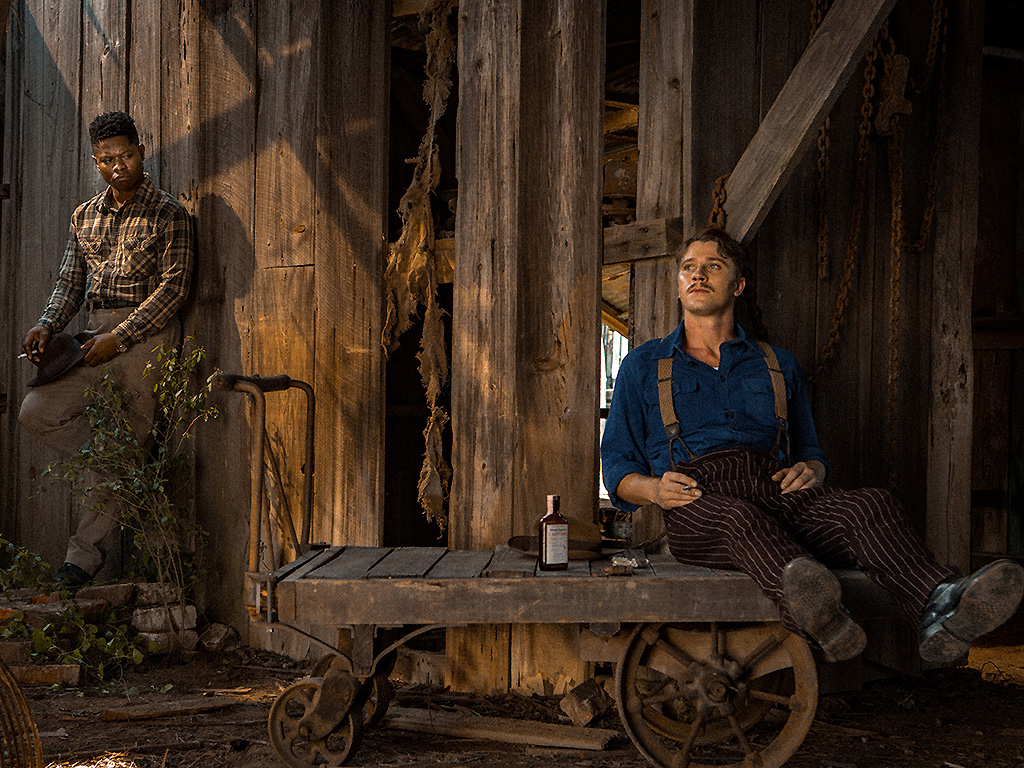Dee Rees’ movie Mudbound premiered at the Sundance Film Festival in 2016, and while it was hailed a critical darling, it had difficulty finding a buyer. That is, until Netflix plopped down a cool $12.5-million offer.

The Second World War-era film, which follows two young men — one black (Jason Mitchell), one white (Garrett Hedlund) — as they return to rural America after serving, is harrowing, dark and eerily relevant today. It’s garnered much Oscar buzz, but it remains a question if the Academy of Motion Picture Arts and Sciences will even consider the movie. Co-starring singer Mary J. Blige and Carey Mulligan, Mudbound is bursting with talent and deserving of all the awards.
READ MORE: Terry Crews names alleged sexual abuser
Hedlund’s character, Jamie McAllan, returns from war and turns to drinking, and strikes up an unexpected connection with Mitchell’s character, Ronsel Jackson, who also has to adapt while trying to survive suffocating racial oppression.
Global News got a chance to chat with Hedlund in September, while the movie screened at the 2017 Toronto Film Festival.
Garrett Hedlund: I’m not encouraging you to be sad all the time, but… it makes me kind of happy that you were sad. [Laughs]
- ‘Trailer Park Boys’ actor Mike Smith to stand trial for sexual assault
- Martin Short’s family ‘devastated’ by death of daughter, Katherine, at 42
- David Bowie’s daughter says she missed dad’s death when forced into rehab centre
- ‘Home Improvement’ star Zachery Ty Bryan jailed after 6th arrest in 5 years
The mud, dirt, dust and rain really contributed to the mood of the movie. Did it feel that way on set while shooting?
It did, big time. Our shoot was relatively short. Five weeks where we really had to battle against the elements. We would have days when we’d be sitting in the trailer with tornado warnings going off all the time. It was summer in New Orleans, it’s very muggy out there.
READ MORE: Rose McGowan says she will plead not guilty to drug possession
You get annoyed sometimes when makeup comes up to you and says, “You’re sweating.” You’re like, “It’s the f**king south!” [Laughs] It was one of the big things that I developed a sympathy, empathy and compassion for — you really wonder how anybody survived without an air conditioner back then. Those houses in those areas are just treacherous shacks, open to all the elements.
The oppressive racial tension, too. How did people survive that? How do people survive that? It still happens today, all the time.
It’s always been happening, it’s still happening today. This post-war period hasn’t really been done very much in movies. You get the ’60s, ’70s… this is a portrait of post-war existing racial tension. In this story, you see somebody — in this case, a black man — go off to war and be a hero, risk their life and fight for their country… to have them come home to their land and town, and they can’t even walk in the front door of the general store. They can’t even use the same restrooms, they have to sit at the back of the bus. It’s painting a portrait of that time.
While race is clearly the most resonant topic of the movie, there’s another one that bubbles below the surface: the substandard treatment of war veterans, and how much that can ruin lives.
When Hillary Jordan was writing this book, she wrote a lot about her own family in the south and coming back from war. She told me that the Jamie character was actually fashioned after her uncle, who had come back from war during this time. He was drinking all the time because he had to escape. He wanted to be an actor and never really got along with his father, just like Jamie.
WATCH: Mark Hamill surprises ‘Star Wars’ fans on Disneyland ride

Get daily National news
This cast does an amazing job of conveying the hardships, you all really do feel like a messed-up extended family.
We did one table read, that’s it. But Dee brought us in for this rehearsal process… and had Carey and I sit across from each other and look each other in the eyes for 10, 15, 20 minutes. Her whole goal was to make us feel uncomfortable and awkward, and then see how we dealt with that.
It still makes you very sick when you have to sit there during those difficult scenes. The racial slurs are being thrown around… you never get over that. Some scenes, especially towards the end [of the movie], can make you sick to your stomach. You go home afterwards, and it’s quite stressful. It is what it is, and everybody knew what we were getting into. It’s bone-chilling, but it’s a portrait of the south in these times. It’s as unsentimental and as real as possible.
‘Mudbound’ is available on Netflix on Friday, Nov. 17.






Comments
Want to discuss? Please read our Commenting Policy first.